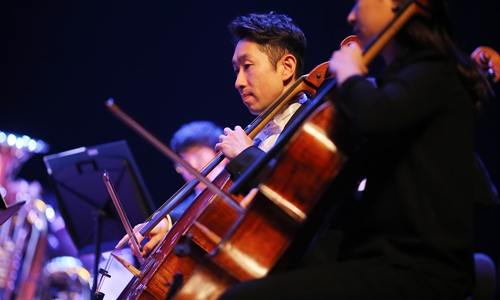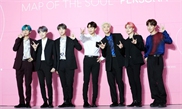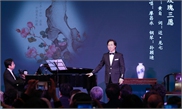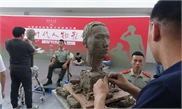ARTS / MUSIC
Orchestra enchants NY with Chinese instruments

An orchestra performs in Nantong, East China's Jiangsu Province in October. Photo: CNSphoto
John Queiroz, a teenager from New Jersey who plays saxophone in his school band, could not hide his excitement during the intermission of the concert by the Symphony Orchestra of the Central Conservatory of Music (CCOM) of Beijing at the Carnegie Hall in downtown Manhattan.
"It's so amazing to see this kind of performance for the first time up front. I can just feel the atmosphere, the joy and the majesty. I feel the music in me," he said, adding that he now has a strong interest in learning to play the bamboo flute.
This is the third year in a row that the CCOM Symphony Orchestra has visited New York. Since its establishment in 2016, it has delivered over 100 concerts to music lovers worldwide.
Yu Feng, the CCOM's president and conductor of the December 13 concert, told the Xinhua News Agency that his goal was to help Americans better understand and like Chinese folk music, and maybe learn to play it, through a decade-long program.
"This year we presented the works of eight of the most active and productive contemporary Chinese composers," Yu said. "The fusion of Chinese folk music with Western orchestra is an exhibition of their innovative comprehension of ethnicity and humanity at large."
The two-and-a-half-hour-long concert featured acclaimed players of traditional Chinese instruments, including bamboo flute players Fan Linfeng and Dai Ya, sheng player Zheng Yang, and pipa player Zhang Qiang.
In the eyes of Hao Weiya, composer of bamboo flutes and orchestra piece The Dream of Peony Pavilion, the concert was an illustration of China's conception of world music, and an embodiment of China's pursuit for a harmonious world.
"All nations and all eras make their own contributions to the music world based on their own understandings. The music we listen to today is the work of the entirety of humanity over the ages," Hao said.
Guo Wenjing, composer of bamboo flutes and orchestra piece The Sorrowful, Desolate Mountain, said that the synthesis of Western orchestra and Chinese folk music not only enriches the former but also gives the latter a greater exposure to Western audiences.
Ekaterina Zarudnaya, a Brooklyn resident who originally came from Sochi, Russia, called the concert "an amazing piece of Asia and of China."
"Whenever the West and the East combine together, it's a great experience," she added.
Many in the audience found sheng extraordinary, one of the oldest Chinese musical instruments that dates back to over 3,000 years ago.
Sheng player Zheng Yang said, "Small as its size is, the particular sound effects of sheng really brings Western orchestra and Chinese folk music together."
"Sheng belongs to China, and it also belongs to the world," Zheng said.
Presented by MidAmerica Productions (MAP), an independent producer of choral concerts at the Carnegie Hall, the concert also opened MAP's 37th annual concert season.
Peter Tiboris, MAP's general director and music director, had conducted the CCOM Symphony Orchestra on a visit to China earlier this year.
"The composers represent not only the best of the best in China; this is some of the most interesting music being written today," he said.
Each work on the program offered a unique perspective on how the modern symphony orchestra can express a Chinese sensibility, Tiboris added.
Timothy Dillon, a local engineer, told Xinhua at the end of the concert that he was very impressed.
"I think Americans should take a bit more time to understand different cultures."



